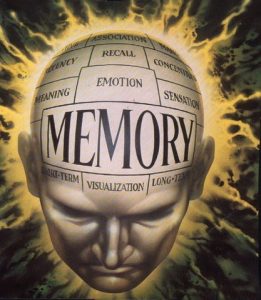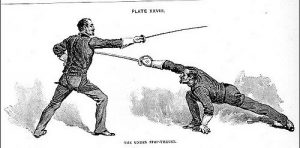
In the last post, we discussed the emotional dynamic that leads to practicing way too fast. Now let’s discuss how emotions can effect memory. Emotions play a huge part in how memories are stored. We process a lot of information on a daily basis, and our brain has systems in place to decide what to keep, and what to discard. This can be simplified into magnitude and repetition.
If an event has great magnitude (i.e. I was chased by a bear) that memory will be filed emotionally. This memory will definitely be a keeper, and if you experience the same event again (or similar, i.e. chased by a wolf), the emotional response will trigger the memories and lessons learned from the bear encounter, and your system will be primed for action. Conversely, if you repeat an action over and over, it will also be burned into your memory, but it will not be bound to a specific emotional response. You will have instantaneous access to the skills and memories you have learned by rote; the only caveat being that an emotional response of sufficient intensity can override your system. This is where the saying “Everyone has a plan ‘til they get punched in the mouth.”(Mike Tyson) comes from.
So how do we use this system to our advantage?

Slow, precise practice allows you to record accurate sequences by rote (that you can recall at will) into your nervous system. As you increase speed, your body adapts and you become more capable of performing the techniques accurately and consistently at higher and higher speeds. When you increase speed the correct way, you get to feel more and more awesome without the side effect of frequent errors bringing you down. This feeling of awesomeness now burns the accurately executed moves into your emotional memory as well, making the moves more and more a part of you. This a scientific way of describing the harmony of mind, body and soul that martial artists have sought for centuries. When it comes time to perform your fight scene, you can now execute it with accuracy and intensity without fear of injuring your partner or forgetting your moves if the emotional state changes. If something goes wrong in the scene, you know you can stop on a dime and take whatever action necessary to complete the scene safely (and if possible invisibly to the audience). Moreover, you have accomplished all of this in as short a time as is humanly possible, you look great doing it, and the audience is blown away by the sheer craftsmanship and flawless intensity of it all.
Compare this to a fight that is learned hastily.

The techniques are flawed and therefore unsafe. A lot of rehearsal time was wasted relearning techniques that should have been learned right the first time. This has led to less repetitions of the fight as a whole, and the repetitions that have been done have been sloppy, and therefore have not been executed the same way each time. This means the rote memory is flawed, and filled with overlapping and often conflicting records of the same sequence of action. Emotions have been the driver of the rehearsals so you can be sure that when performance energy is added to the mix (i.e. an audience) things will only get more and more out of hand. Worse yet, now you won’t even have the supervision of the fraudulent fight coordinator that allowed things to get to the point in the first place. All after-the-fact fixes will fly out of the window and the actors will resort to the adrenaline-fueled sloppiness that they began the entire process with. If the emotional state differs from what was practiced, they may forget the next move mid-fight, panic and resort to actions even more dangerous.

I have watched this dynamic happen countless times, and it has become more and more commonplace in the current, over-saturated landscape of stage and screen where everyone who has ever held a sword claims to be a fight coordinator. I hope this series of posts will help any actors reading them make the most of their fight scenes in a safe, efficient and impactful manner. The best thing you can do to protect yourself is to demand a controlled pace with specificity and consistency of action at all times. If you don’t receive that, walk away and live to fight another day(pun intended). Even better, learn theatrical combat from someone the right way so you can walk on to the stage or set with the tools you need to navigate this increasingly dangerous terrain safely.

